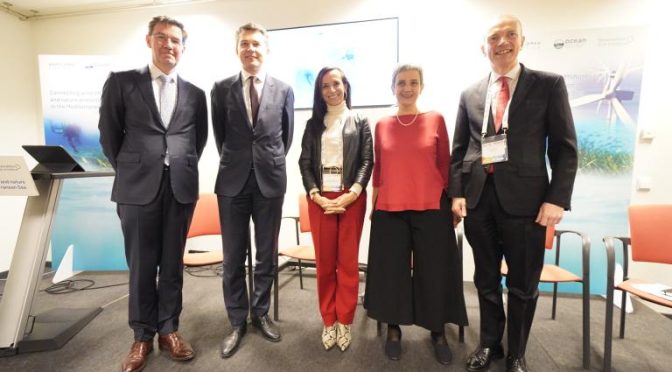Through the creation of the ‘Offshore Coalition for Energy and Nature’ in the Mediterranean (MED OCEaN), an initiative promoted by the Renewables Grid Initiative (RGI).
The OCEaN initiative has been working since 2020 in Northern Europe to promote the development of offshore wind energy and the network necessary for its connection, with solutions that also guarantee the protection and restoration of nature in the North and Baltic Seas. Now this initiative reaches the Mediterranean.
The TSO model, predominant in Europe, has shown that it provides technical and economic efficiencies, benefits in terms of robustness and security of the system and that it guarantees neutral access to infrastructures, allowing orderly development, with less impact on the marine environment, and non-discriminatory access for offshore wind generation.
The carriers and operators of the Spanish, French and Italian electricity systems (Red Eléctrica de España, RTE and Terna, respectively) finalize, together with NGOs and the wind industry, the launch of the ‘Offshore Coalition for Energy and Nature’ in the Mediterranean (MED OCEAN). This initiative, which already exists in Northern Europe and is promoted by the Renewables Grid Initiative (RGI), was presented during the celebration of WindEurope 2022, the global wind industry meeting that is being held these days in Bilbao in the hand of the European Commission and in which the sustainable expansion of offshore wind energy and the necessary development of the network to make it possible are discussed.
Offshore wind energy is a key element to increase the security of electricity supply in Europe and contribute to achieving the goals of climate neutrality for 2030 and 2050. Thus, the Mediterranean countries play an important role in its development, with a forecast of reaching more than 76 GW of installed power by 2050. To achieve this, it is important to properly plan and manage its expansion, which is still at an early stage of development.
The president of Red Eléctrica, Beatriz Corredor, attended this meeting and highlighted that “coordination between all the parties is going to be essential for this development to be as effective and efficient as possible, limiting its impact both on the communities , as in the biodiversity of the environment, through dialogue with the territories”. And he adds, “we believe that for it to be a success, the TSO model must prevail, that is, one in which the carrier and operator of the electricity system builds, operates and maintains the infrastructure of the marine network until its connection with the terrestrial network, contributing all his knowledge and experience. This model, predominant in Europe, has shown that it provides technical and economic efficiencies, benefits in terms of system robustness and security, and that it also guarantees neutral access to marine network infrastructures, allowing orderly development, with less impact on the marine environment, and non-discriminatory access for this type of generation. From Red Eléctrica we are ready to do it”.
For his part, Giles Dickson, CEO of WindEurope, pointed out that the 76 GW of offshore wind power planned in the Mediterranean for 2050 “would mean up to 100,000 million euros in new investments and would contribute to improving the energy security of the Mediterranean basin. To harness this potential, countries need to set clear goals, ensure that paperwork and permits are managed efficiently, and coordinate and collaborate with each other. In addition, it is essential that this development be done in a way that respects the environment.”
For Antonella Battaglini, CEO of RGI, “the current energy crisis confirms that we need to massively expand renewable energy generation in Europe and deploy an electricity grid infrastructure that allows deep electrification. The Mediterranean, due to its rich biodiversity and the initial phase in which the development of offshore wind energy is, offers us a unique opportunity to demonstrate that it is possible to build energy infrastructures and at the same time protect and conserve nature. Cross-sector solutions will reduce Europe’s current energy dependencies and provide strong ecosystems capable of sustaining economic activities.”
The head of Environmental Governance at SEO/BirldLife, David Howell, has pointed out that “it is essential that the energy transition is accelerated while we respond to another great global challenge: halting and reversing the loss of biodiversity. Territorial planning and positive impact sector practices play a central role, both in infrastructure developments on land and at sea In the case of offshore wind energy, we must maintain a close and continuous dialogue between all actors to help find and promote the right solutions and, therefore, generate and maintain the confidence of investors and citizens”.
The ‘Offshore Coalition for Energy and Nature’ (OCEaN) has been working since 2020 in Northern Europe to promote the development of offshore wind energy and the grid, with solutions that also guarantee the protection and restoration of nature in the North and Baltic seas. Now this initiative reaches the Mediterranean.


